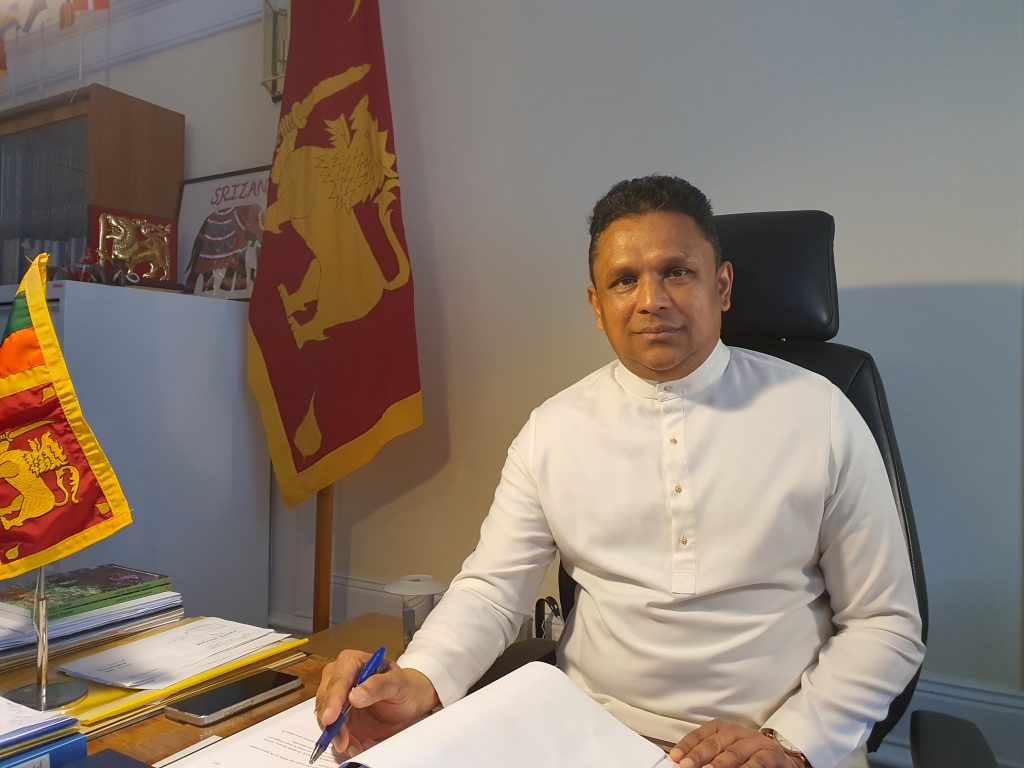Three Quick Ones -Daniel Hörnqvist CEO Frank Dandy
3 quick questions to Frank Dandy about moving production to Sri Lanka
Since 2017, Daniel Hörnqvist has been the CEO of the Swedish fashion brand Frank Dandy. When he took over, he brought with him extensive experience from e-commerce and the outdoor market. This included responsibility for the launch of the e-commerce brand Bikester in the Nordic region in 2013. In 2015 he took on a position as board member at Frank Dandy before moving on to an executive role. One of the most important decisions in recent years for Frank Dandy has been to move manufacturing to Sri Lanka.

What is Frank Dandy’s market position?
We address a clearly defined target group between 20 and 30 years of age outside the metropolitan areas. The target group has a desire to achieve high personal goals and we provide secret superpowers to enable that. This promise permeates all our communication, not at least the visual. We are mainly present in the Nordic region and work with the same brand position in all geographical markets. A solid sustainability practice is also extremely important to us, especially from an employer brand perspective. Frank Dandy is affiliated with the initiative Better cotton and we only use recycled polyester in our swimwear. I would also like to mention our ownership program for our employees.
Why did you move manufacturing to Sri Lanka?
The decision to move manufacturing from China was made with the experience of the pandemic and in light of Russia’s war of aggression against Ukraine. We needed to increase our geopolitical preparedness. I had met lot of positive mentioning about manufacturing in Sri Lanka and as well had my own personal experience from a surf trip a few years earlier. Since the move to Sri Lanka, our experience has been consistently positive. The Sri Lankan manufacturing industry is technically advanced, and we can follow the manufacturing of our products in real time from Sweden. The Sri Lankan manufacturing industry’s sustainability ambitions are high, both in terms of renewable electricity use and in the development of sustainable wastewater systems from production. The country is buzzing with growth and the high level of education is evident in everything.
What has the membership of the Sweden-Sri Lanka Business Council meant?
The membership was an incredible door opener when we were in the process of evaluating whether to move manufacturing to Sri Lanka. It helped us build relationships that I don’t think would have been possible otherwise. To spread our risks, we moved our manufacturing gradually and without the support of the SSLBC it would have been much more complicated.
Newsletter ECCSL
March 2024 newsletter from our sister organisation the European Chamber of Commerce in Sri Lanka. SSLBC has contributed with one article.
3 questions for Dharshana M. Perera, Sri Lanka’s ambassador to the Nordic and Baltic countries
3 questions for Dharshana M. Perera, who in March 2024 will take on a new post at the Ministry of Foreign Affairs in Colombo, ending three intense years as Sri Lanka’s Ambassador to the Nordic and Baltic countries. Dharshana M. Perera has a long diplomatic career and prior to his career in diplomacy had worked as an academic and in the international Sri Lankan business community.

What do you take away from your three years as Ambassador to the New Nordics?
Among the important features I observed, were the values Sri Lanka shares with the region we refer to as the New Nordics which is covered by the Embassy in Stockholm. It includes Sweden, Denmark, Finland, Iceland, Norway, Lithuania, Latvia and Estonia. Shared values of democracy, open economic orientation as well as the climate & environment are so critical to our societies to nurture. Sri Lanka is one of the oldest democracies in Asia and we share this heritage with this region. We are also open, export-oriented economies. We share similar views on climate and environment – deeply committed to reaching climate goals. This is a solid foundation for generating business with Sri Lanka and I am pleased to see that this area has particularly strengthened in recent years.
Foreign Minister, Hon. Ali Sabry, discussion in May 2023, significantly elevated the Bilateral engagement with Sweden with good outcomes from his meetings with Speaker, H.E. Andreas Norlén, and Swedish Foreign Minister H.E. Tobias Billström.
The Indo-Pacific EU Ministerial Meeting hosted by Sweden at the time was a significant opportunity for Sri Lanka’s engagement with the EU, placing Sri Lanka in the heart of the EU-Indo Pacific dialogue. His meetings with the SSLBC, top-level business executives in Stockholm and the business community as well as the Sri Lankan community added to the depth and breadth of our engagement.
Several Swedish companies have operations in Sri Lanka. How can relations be further developed?
Sweden has been and is an important partner to Sri Lanka. We established formal diplomatic relations 75 years ago, just a little over a year after Sri Lanka regained independence. The Kotmale hydroelectric dam symbolizes the excellent partnership in development cooperation. The dam was built by the international Swedish construction company Skanska financed by SIDA. It continues to provide electricity- a clean form of energy – and contributes to important irrigation solutions for agriculture and livelihoods. We are committed to ensure that by 2030, 70 % of Sri Lanka’s energy needs are renewable. But, this requires different partnerships, both in terms of investment financing and construction. Solar, wind and green hydrogen are where I see several openings for Swedish companies. Additionally, there is a valuable opportunity in the IT-sector. Several Swedish IT companies have long had important parts of their operations located in Sri Lanka. As Swedish IT company, IFS, has described Sri Lanka is ”the backbone of its global operations” and “the jewel in the IFS crown”. Other IT companies include Cambio, SoftOne, Ascentic, e-Builder and several others. Sri Lanka can be a catalyst in raising competitiveness of Swedish businesses by meeting the IT and tech needs which are in short supply, especially in AI and other sectors. The multifaceted, diverse, compact, all-year-round destination is another area for a stronger partnership with the New Nordic Region. Sri Lanka’s tourism product really does encapsulate Asia in one Island. Apart from the Embassy, Sweden Sri Lanka businesses including the Sweden-Sri Lanka Business Council (SSLBC) have an important role to play and be a strong voice for business and to raise awareness of the business opportunities in several sectors. Sri Lanka and I personally are grateful for the very productive collaboration we have with the President at the SSLBC, Jan Campbell, and his team of the SSLBC.
Can business relations with Sri Lanka also be strengthened in Sweden?
The past year has been particularly successful in the business pillar. Firstly, in partnership with Innovation Lab, Copenhagen, the Export Development Board and SLASSCOM, the Embassy at the Consulate in Gothenburg in May/June 2023 organized the IT Nordic Mission in the respective cities. Following the release of the IT Eco System IT Industry Report in Copenhagen and the engagement with the business partners in the three major cities, several IT and technology partnerships were established. This builds upon the excellent Sweden-Sri Lanka IT-related business enterprise we have.
Secondly, the Embassy was part of the team which conceptualized and facilitated the multi-tiered initiative on CleanTech transport, Clean Energy systems, e-mobility and IT which led to the establishment of a ground breaking partnership between one of Sri Lanka’s most diversified IT conglomerates – OREL IT – and Gothenburg’s ANODOX. The agreements were signed in October 2023. This was followed by a soft launch in Gothenburg. It will link the country into the EV battery global supply network. This project, amongst others, symbolizes the untapped potential for business which exists between the two countries and the region, bringing together synergies with Sri Lanka. We had excellent support from facilitators such as MobilityGuard, Gothenburg. The Mayor of Partille Municipality and Business Region Gothenburg support the partnership.
In summary, Sri Lanka can be an excellent partner with the region to sharpen the competitiveness and to diversify supply networks in a range of business pillars. The well-educated, highly skilled, English speaking talent pool with good business practice makes this engagement robust for long term mutually beneficial business partnerships.
Naturally, we and our partners are enthused about celebrating 75 years of diplomatic relations in 2024 – the anniversary which falls on 19th November this year.
Invitation for Proposals: Development of 50MW Wind Farm Facility at Mannar, Sri Lanka
The Cabinet Appointed Negotiating Committee of the Ministry of Power and Energy extends an invitation for proposals regarding the development of a 50MW Wind Farm Facility in Mannar, Sri Lanka, operating under a Build, Own, and Operate (BOO) arrangement.
This project stands as a cornerstone in Sri Lanka’s ongoing endeavors to bolster renewable energy initiatives, reinforce energy security, and combat greenhouse gas emissions.
We kindly request your assistance in ensuring adequate publicity for the aforementioned notice among the potential bidders.
Attached herewith is the document which provides comprehensive details on accessing the Request for Proposals (RFP), submission guidelines, and essential contact information for any inquiries or clarifications. Furthermore, the RFP document will be made available for inspection at https://www.ceb.lk/tender-notice/en
Submission Deadline: May 09, 2024
For additional information, please visit our website at https://www.ceb.lk/

Ball in Sri Lanka’s court’ as Japan seeks to deepen ties in bid to counter China’s Indo-Pacific influence
- Sri Lanka’s 2020 decision to drop a light rail project financed by Japanese companies led to friction between the countries, amid Colombo’s pivot to China
- Japan has become more ‘astute’ in its approach to Sri Lanka, given its interest in a rules-based Indo-Pacific region and countering Chinese influence in the Indian Ocean
For two years, preparatory work and planning went on to replace and upgrade a majority of Helsingborg’s port’s digital systems.
For two years, preparatory work and planning went on to replace and upgrade a majority of Helsingborg’s port’s digital systems. And after just two months, many of the most important metrics are back at the same levels as before the shift. According to IT manager Sanjin Redzepagic, collaboration and careful inventory have been two of the success factors for the successful transition.
We have changed pretty much our entire system flora at one and the same time. We have been working for over two years on this implementation and went live with everything in one day, and apart from an expected decrease in productivity in the first time, everything has gone well, says Sanjin Redzepagic, IT manager, Helsingborgs Hamn.
COORDINATION BIG CHALLENGE
Business systems, terminal systems, financial systems, container handling systems – everything has been replaced. In total, it is about 200 employees at the Port of Helsingborg who, together with approximately 500 to 1000 customers, have received new digital workspaces.
All customers have received new customer pages and all truck drivers now manage the delivery and collection of goods with an app instead of paper and pen, to name a few of the changes.
– It was an enormous amount of work to map all processes and functions. The big challenge was to coordinate everything, not least because so many meetings were only managed digitally. The fact that we recast our IT department a few years ago to have a greater focus on business development and to become more involved in the processes of each business has been decisive for the success of this major shift.
NEW HARBOR WITHIN FIVE YEARS
The background to the system change is that the entire port is to be successively modernized with the hope that Helsingborg will have a completely new port sometime before 2030. It is part of the goal of becoming ”the most modern port in the Nordics”.
– It’s not just about having modern technology gadgets and gadgets at our disposal; it is at least as much about us having the most satisfied employees and about being an important, climate-smart playing partner for all the social actors we are in contact with. We are also part of Helsingborg’s investment in the smart city.
SAME FIGURES – AFTER TWO MONTHS
Sanjin Redzepagic is satisfied that the system change is done, and that you now have time to continue screwing, updating and adjusting. In the beginning, there were some things that went wrong, not least what is called Electronic Data Interchange (EDI), which helps transfer information about, for example, inventory balances and order confirmations between different systems.
– Even though we were well prepared, it is a big change. But already two months later, we are back to the same figures as before the introduction, for example regarding how long it takes from the time a truck is here until all goods are loaded. I’m sitting in this now and I see on my screen that the average time is 22 minutes, which is exactly what it was before we went live. It’s amazing when you consider the impact this has had on all our employees and customers.
What tips do you have for those who are going to undergo similar, large system replacements?
– Know your business well, involve the right skills, and be thorough in the inventory. If it’s something that will affect users and customers outside of the business itself, make it a priority to address their feedback and fix issues they discover.
NEXT STEP: AUTONOMOUS VEHICLES
The next step in the port update work for Sanjin Redzepagic and his colleagues is to test autonomous vehicles that could speed up the process of loading and unloading ships. Customer benefit and sustainability are in focus.
– Together with a number of other companies, we are testing how autonomous vehicles would function in such a varied environment as a port is. The sustainability and climate issue is important to us, and we introduced the first electric truck as recently as February this year. We are probably one of the first ports in the world to do that.
https://voister.se/artikel/2024/03/succe-for-helsingborgs-hamns-stora-it-systemskifte
Konferens i Colombo
Nyhetsbrev ECCSL
Läs gärna vår systerorganisation European Chamber of Commerce in Sri Lanka senaste nyhetsbrev.
